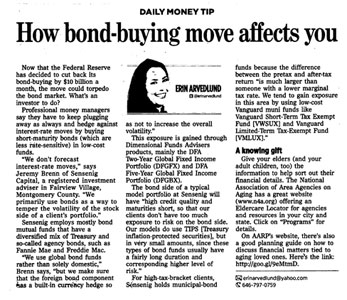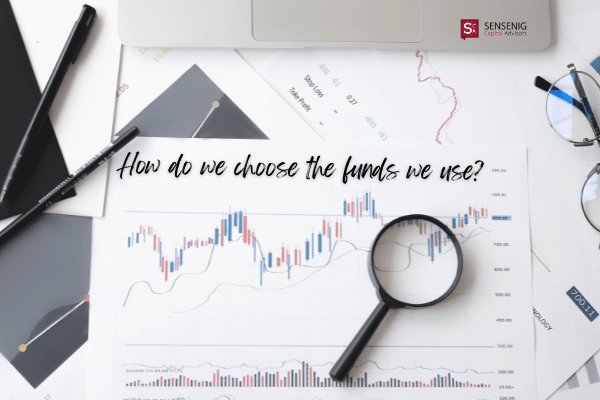Sensenig Capital Advisors was recently quoted in the Philadelphia Inquirer by financial journalist Erin Arvedlund. The article “Your Money: What Fed’s bond-buying move means to an investor” discusses Sensenig Capital’s philosophy on bonds and the role they play in client portfolios. Read the entire article below or click here to go directly to the Inquirer’s website.
“Your Money: What Fed’s bond-buying move means to an investor” – Erin E. Arvedlund
Now that the Federal Reserve has decided to cut back its bond-buying by $10 billion a month, the move could torpedo the bond market. What’s an investor to do?
 Professional money managers say they have to keep plugging away as always and hedge against interest-rate moves by buying short-maturity bonds (which are less rate-sensitive) in low-cost funds.
Professional money managers say they have to keep plugging away as always and hedge against interest-rate moves by buying short-maturity bonds (which are less rate-sensitive) in low-cost funds.
“We don’t forecast interest-rate moves,” says Jeremy Brenn of Sensenig Capital, a registered investment adviser in Fairview Village, Montgomery County. “We primarily use bonds as a way to temper the volatility of the stock side of a client’s portfolio.”
Sensenig employs mostly bond mutual funds that have a diversified mix of Treasury and so-called agency bonds, such as Fannie Mae and Freddie Mac.
“We use global bond funds rather than solely domestic,” Brenn says, “but we make sure that the foreign bond component has a built-in currency hedge so as not to increase the overall volatility.”
This exposure is gained through Dimensional Funds Advisers products, mainly the DFA Two-Year Global Fixed Income Portfolio (DFGFX) and DFA Five-Year Global Fixed Income Portfolio (DFGBX).
The bond side of a typical model portfolio at Sensenig will have “high credit quality and maturities short, so that our clients don’t have too much exposure to risk on the bond side. Our models do use TIPS [Treasury inflation-protected securities], but in very small amounts, since these types of bond funds usually have a fairly long duration and corresponding higher level of risk.”
For high-tax-bracket clients, Sensenig holds municipal-bond funds because the difference between the pretax and after-tax return “is much larger than someone with a lower marginal tax rate. We tend to gain exposure in this area by using low-cost Vanguard muni funds like Vanguard Short-Term Tax Exempt Fund [VWSUX] and Vanguard Limited-Term Tax-Exempt Fund [VMLUX].”



